- Home
- Parnell Hall
13 Suspense
13 Suspense Read online
Praise for Parnell Hall’s mystery SUSPENSE
“Hall’s deadpan style of satire makes mincemeat out of the pretentious author and his entourage of cynical agents, editors, and publicists, each of whom keeps telling Stanley (in hilariously abusive dialogue) what a lousy novel his case would make. Rising above their contempt, the sad-sack detective plods along after his clients, dodging razors and bombs, and picking up enough hot dish on the publishing trade to write a very funny book of his own.”
—Marilyn Stasio, New York Times Book Review
“First-class fun from start to finish.”
—Booklist
“When it comes to humor, Parnell Hall continues to help set the standard.”
-San Jose Mercury News
“Amusing, tongue in cheek ...The milieu with all its vagaries proves a ready target for Hall’s well-aimed barbs as he ...offers a delightfully accurate account of a bookstore signing. ...Hall proves as adept at creating on-page suspense as he is at lampooning it.”
—Publishers Weekly
“Hall tells a good tale, creates a cast of colorful, slightly eccentric characters, and gives them some of the best dialogue in the genre.”
—Kirkus
“Hall has a slyly delightful time skewering the publishing field and best sellers ...Hall probably had as much fun injecting little mystery “traditions” as the reader will have discovering them.”
—Oline H. Cogdill, Fort Lauderdale Sun-Sentinel
SUSPENSE
Parnell Hall
Copyright © 1998, 2010 by Parnell Hall
Published by Parnell Hall, eBook edition, 2010
Originally published in hardcover by Mysterious Press, Warner Books Inc., 1998.
ISBN: 0-89296-624-6
All rights reserved. No part of this book may be reproduced in whole or in part without written permission from the author, except by reviewers who may quote brief excerpts in connection with a review in a newspaper, magazine, or electronic publication; nor may any part of this book be reproduced or transmitted in any form or by any means, electronic or mechanical, without permission in writing from the author.
ISBN (Kindle): 978-1-936441-10-5
ISBN (ePub): 978-1-936441-11-2
Cover design by Michael Fusco Design | michaelfuscodesign.com
For Jim and Franny
Table of Contents
Chapter 1
Chapter 2
Chapter 3
Chapter 4
Chapter 5
Chapter 6
Chapter 7
Chapter 8
Chapter 9
Chapter 10
Chapter 11
Chapter 12
Chapter 13
Chapter 14
Chapter 15
Chapter 16
Chapter 17
Chapter 18
Chapter 19
Chapter 20
Chapter 21
Chapter 22
Chapter 23
Chapter 24
Chapter 25
Chapter 26
Chapter 27
Chapter 28
Chapter 29
Chapter 30
Chapter 31
Chapter 32
Chapter 33
Chapter 34
Chapter 35
Chapter 36
Chapter 37
Chapter 38
Chapter 39
Chapter 40
Chapter 41
Chapter 42
Chapter 43
Chapter 44
Chapter 45
Chapter 46
Chapter 47
Chapter 48
Chapter 49
Chapter 50
Chapter 51
Books by Parnell Hall
1.
“I’M IN DANGER.”
Oh, dear.
If you’re a private detective, that’s an occupational hazard. People bring you their troubles. They expect you to fix them. They think that you can.
They watch a lot of TV.
Unfortunately, it isn’t like that. I’ve been a private eye for years, and any resemblance between me and a TV detective is entirely coincidental and not to be inferred. I don’t have fist fights or car chases, and don’t even carry a gun. I carry a camera and take pictures of cracks in the sidewalk. Probably not that big a help to someone in danger.
I smiled at the young woman who had graced my office first thing on a Monday morning. Gave her my best apologetic I-am-not-a-TV-detective shrug. “I’m sorry,” I said. “I’m not a bodyguard.”
“I don’t want a bodyguard.”
“That doesn’t matter. If your problem is you’re in danger, you’ve come to the wrong place. I don’t deal in danger. I deal in accidents. If you have an accident, I will come to your home, interview you, and photograph your broken arm or leg, so you can sue the City of New York. If you’re in danger, I doubt if these skills will help you.”
“Yes, yes,” she said, impatiently. “I know all that. You do negligence work. Most private detectives do. But isn’t that still investigating, solving problems, figuring things out?”
I hesitated. Not to disparage the work I do, but most of it requires no intelligence whatsoever. My duties for the law firm of Rosenberg and Stone consisted of driving around in my car waiting for people to call in response to their TV ads. When they did, the office would beep me and send me out to sign them up. But there was no discretion exercised, no thought process required. I was not called upon to judge the merits of the case. Whatever the client told me, I dutifully took down and passed on to Richard Rosenberg, who would eventually decide whether or not to keep it. Rarely was my opinion asked. Rarer still was it ever acted upon.
But I didn’t really feel like getting into all that.
“Uh-huh,” I said. “Thanks for your support. Still, I doubt if I’m equipped to deal with danger.”
“How do you know until you’ve heard?”
I sighed, leaned back in my desk chair, sized her up. She had curly red hair, a sprinkling of freckles, green eyes, and a turned-up nose. She was wearing a scoop-neck pale blue pullover, and had very large breasts.
I have trouble dealing with women in general, and attractive women in particular. A redhead only complicates the problem. Throw in a pair of large breasts and I’m really in trouble.
I also realized I had forgotten her name. I’m terrible with names. “All right, look, Ms. ...”
“Winnington. Maxine Winnington,”
“All right, look, Ms. Winnington,” I said. “Frankly, I don’t think there’s anything I can do for you. But if you wanna tell me your story, tell it fast, because I have an appointment in Harlem in half an hour and I’ve gotta get out of here.”
“You have an appointment?”
“Yes.”
“Could you cancel it?”
“Not very well. But this is beside the point. Why don’t you tell me. How are you in danger?”
“I’ve had threats.”
“Threats?”
“Yes.”
“What kind of threats?”
“Anonymous threats.”
“Uh-huh,” I said. “You wanna speed this along? What kind of anonymous threats? Who’s making them? How are they being made? Don’t make me ask all the questions, just tell me the score.”
She looked irritated. “Because you have an appointment.”
“That’s part of it.”
“Just part of it?”
“Well, it’s a lot of it. It does happen to be a fact.”
“You’re saying you can’t concentrate on my problem because you have other work?”
“I suppose that’s one way of putting it.”
“Work for which you are being paid?”
“Yes
, of course.”
“Uh-huh,” she said.
She set her purse down on my desk, snapped the top open, reached in, and pulled out a huge wad of cash.
2.
YOU HAVE TO UNDERSTAND.
I run a business. The Stanley Hastings Detective Agency. Of which I am the sole proprietor and sole employee.
It is a profit-making organization. At least it was intended to be. It is supposedly the means by which I support my wife and child—not an easy thing to do in New York City—and fill in the gaps between my writing and acting gigs, which are what I think of as my real professions, as what I actually do. The private detective work, you see, is merely a temporary job. A full-time temporary job. Which I’ve been doing for years.
But that’s beside the point. The point is, I’m in it for profit.
Why am I explaining all this? Well, because I’m not particularly proud of my reaction when Maxine what’s-her-name pulled out the wad of money.
I should have told her to go to hell. I should have told her it made no difference. I should have told her I couldn’t be bought.
On the other hand, the older I get, the less idealistic and more materialistic I seem to be. I don’t know if this is a common trait or if it is just me, but it certainly seems to be true. Anyway, when Maxine whipped out the money, instead of throwing her out of my office, I decided to hear what she had to say.
Still, I put up a good, front. “Never mind that,” I said, waving the money away, as if it were the last thing on my mind. “I’m perfectly willing to listen. Just tell me what your problem is, so I can see if there’s anything that I can do.”
“I told you,” she said. “I’ve had threats.”
“What kind of threats?”
“I told you. Anonymous threats.”
“What kind of anonymous threats,” I said.
As I did, I realized my ignominy was complete. Having flashed the money, she had walked me through the identical series of questions I had balked on before. Clearly as an object lesson, to let me know who was in charge.
She didn’t glory in her victory, however. Instead, I swear to god, she looked around, lowered her voice, leaned in confidentially, and said, “Phone calls.”
I blinked. “Phone calls?”
“That’s right.”
“You’ve been getting threats over the phone?”
“Uh-huh.”
“From whom? A man or a woman?”
“I don’t know.”
“You don’t know?”
“No. It’s a low hoarse voice. A whisper. It could be anyone.”
“What does the voice say?”
“They’re horrible messages. Horrible.”
“I understand. Such as.”
“You’re going to die.”
“What?”
“That’s it. The whole message. I pick up the phone, say hello. This hoarse voice says, You’re going to die, and hangs up.”
“How many times has this happened?”
“That one, I think twice.”
“That one? You mean there’ve been others?”
“Yes, of course.”
“How many others?”
“I don’t know. Maybe ten. Maybe a dozen. After a while I lost track.”
“The same voice?”
“As far as I can tell.”
“What are the messages?”
“All variations on the same theme. The underlying message is, You’re going to die. Die, bitch, die was one. Death to the bitch was another. Are you ready to die? was another.” She cocked her head at me. “You get the gist?”
“I think so. Tell me more. As many as you can remember.”
“Why?”
“I want to see if there’s a pattern to this.”
“There’s a pattern all right. Someone wants me dead.”
“Beside that, I mean.”
“Beside that I don’t much care.”
“You’d like to find out who’s been making these threats, wouldn’t you?”
“Yes, of course.”
“So humor me.”
“Okay,” she said. “I think I’ve given you the general tenor. But as for specific messages, we have Your death will be ugly. We have The end is near. We have You’ve been warned. We have Prepare to die.” She turned to me expectantly. “So, what does that tell you?”
Not much. I had the general impression someone wanted her dead, but I doubt if she’d have been too thrilled with that assessment.
And there was that big wad of money.
“Well,” I said. “One of the threats was rather revealing.”
She raised her eyebrows. “Oh?” she said. “Which one is that?”
“You’ve been warned.”
“You’ve been warned? Of course I’ve been warned. What’s so revealing about that? It seems to me every one of these calls is a warning.”
“Yes and no,” I said.
She frowned. Looked irritated. “Just what do you mean by that?”
“All of the other phone calls just tell you you’re gonna die. They don’t express it in terms of a warning, just as a statement of fact. The intention is not to warn you but to scare you.”
“So what? You’ve been warned is the same thing. It’s not supposed to warn me, it’s supposed to scare me.”
“Maybe so, but it introduces the concept. It’s the only phone call that does, and it’s a whole different idea. Because of the implication.”
“What implication?”
“That there’s something you could do about it. That’s the whole intent of a warning. The implied if. If you don’t stop that, I’ll kill you. See what I mean?”
Her eyes were wide in disbelief “Semantics?” she said. “You’re giving me semantics?”
I certainly was.
“Absolutely not,” I told her. “I’m just trying to make a point. You have been warned implies that there’s a way out. At least in the mind of the person making these phone calls. That all these threats are conditional. That if you were to do something, or stop doing something, or in some way alter your behavior, these threats would no longer apply. See what I mean?”
She was looking at me with distaste. “Jesus Christ,” she said. “Don’t tell me you’re a writer.”
“You have something against writers?”
“You mean to say you are?”
“I’ve done some writing in my day. No big deal. Why?”
“Have you ever heard of Kenneth P. Winnington?”
I blinked. Who hadn’t heard of Kenneth P. Winnington? His books were on the New York Times best-seller list every week, right up there with John Grisham and Mary Higgins Clark.
“The writer?” I said.
“Author.”
“Huh?”
“The author. If you’re unpublished, you’re a writer. Or if you write for movies or TV If you write books, you’re an author.”
Well, excuse me. I recalled that she had referred to me as a writer. I resented it. Particularly since by her criteria I was.
“Sorry,” I said. “The author. And what has Kenneth B. Winnington got to do with you?”
“He’s my husband.”
3.
ALICE WAS IMPRESSED. “KENNETH P. Winnington?”
“That’s right.”
“The writer?”
“Author.”
“Huh?”
“He likes to be called an author.”
“Then call him an author. Stanley, this is great.”
“What’s so great about it?”
“Are you kidding me? In the first place, it’s money. In the second place, it’s Kenneth P. Winnington.”
“It’s his wife.”
“Same thing. You’re sure to meet him, aren’t you?”
“Yeah. So?”
“So maybe you could pick up something useful.”
“Useful?”
“Yeah. Maybe you could learn something from him. About how to write.”
“I don’t need
someone to tell me how to write.”
Alice put up her hands. “No, no. I didn’t mean that. Of course not. It’s just that he’s on the best-seller list.”
“You ever read one of his books?”
“No.”
“Neither have I.”
“What’s your point?”
“My point is if he doesn’t write the type of book we would read, he probably doesn’t write the type of book I would write.”
“How do you know?”
“I have some standards.”
“Oh? This from the man who wrote a karate movie with four hot babes?”
I grimaced. “That was different.”
“How is it different?”
“That was the movies. Movies make you crazy. People do things they wouldn’t normally do.”
“Uh-huh,” Alice said. “Anyway, you’re gonna be working for this guy.”
“For his wife.”
“Uh-huh. Too bad you’re not familiar with his books.”
“Why?”
“Maybe you should read one.”
“Alice, I don’t need to read the guy’s books to find out who’s harassing his wife.”
“How do you know? Maybe someone’s pissed off about something he wrote.”
“So they kill his wife?”
“Stranger things have happened.”
“Yeah, sure. In a book.”
“Exactly.”
I opened my mouth. Closed it again.
“When do you start?”
“Tomorrow. If.”
“If what?”
“If I take the job.”
“You didn’t take it?”
“I told her I had to talk to Richard.”
“You didn’t talk to him yet?”
“No.”
“Why not?”
“I thought I should talk to you.”
“Why?”
“To see how you felt about it. I mean, basically, the woman wants a bodyguard.”
“No, she doesn’t.”
“Sure, she does. She’s being threatened.”
Alice shook her head. “If she wanted a bodyguard, she’d hire some beefy ex-cop who carried a gun. She doesn’t want a bodyguard, she wants someone to figure out what’s happening.”
“That wasn’t the job description.”
“What was the job description?”
I wasn’t sure. All I knew was the woman wanted help with her problem and was willing to pay five hundred bucks a day. If I was willing to help her, I was to show up at her apartment tomorrow morning at nine o’clock. If I wasn’t willing to help her, I was to call her and let her know so she could get someone else.

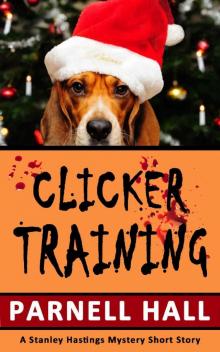 Clicker Training
Clicker Training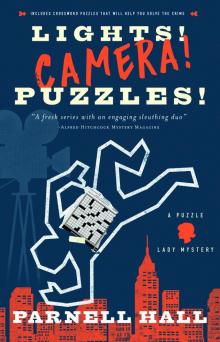 Lights! Camera! Puzzles!
Lights! Camera! Puzzles!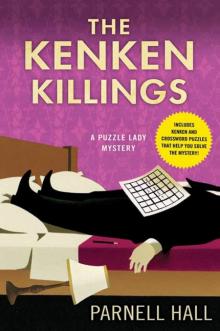 The KenKen Killings
The KenKen Killings 12-Scam
12-Scam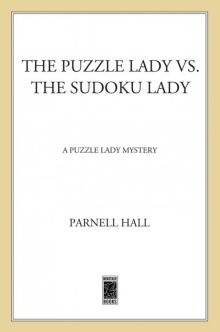 The Puzzle Lady vs. the Sudoku Lady
The Puzzle Lady vs. the Sudoku Lady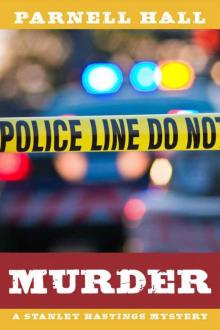 2 Murder
2 Murder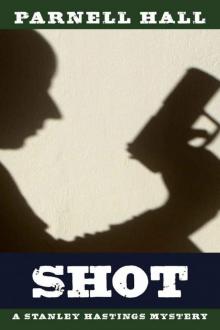 7 Shot
7 Shot You Have the Right to Remain Puzzled
You Have the Right to Remain Puzzled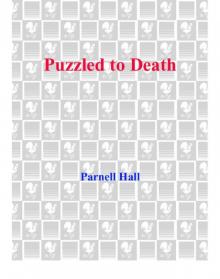 Puzzled to Death
Puzzled to Death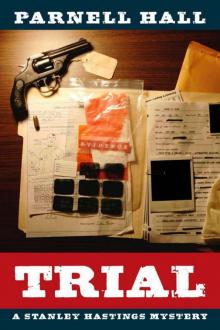 11-Trial
11-Trial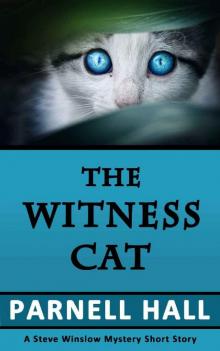 The Witness Cat (Steve Winslow Mystery)
The Witness Cat (Steve Winslow Mystery)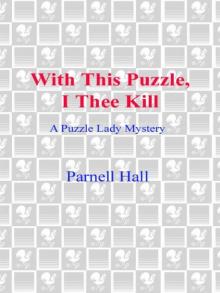 With This Puzzle, I Thee Kill
With This Puzzle, I Thee Kill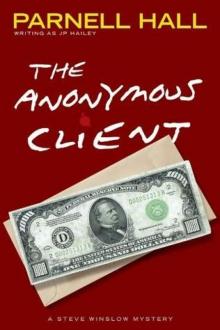 The Anonymous Client sw-2
The Anonymous Client sw-2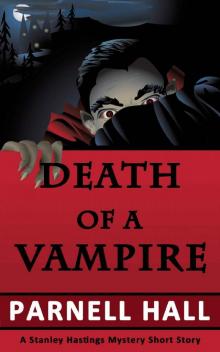 Death of a Vampire (Stanley Hastings Mystery, A Short Story)
Death of a Vampire (Stanley Hastings Mystery, A Short Story)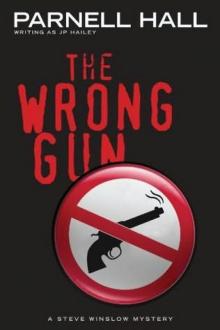 The Wrong Gun sw-5
The Wrong Gun sw-5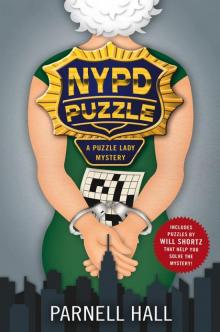 NYPD Puzzle
NYPD Puzzle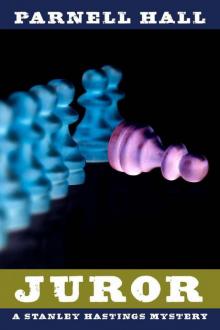 6 Juror
6 Juror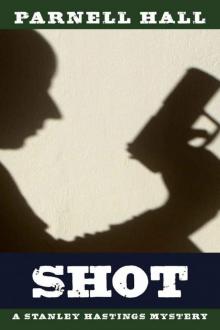 07-Shot
07-Shot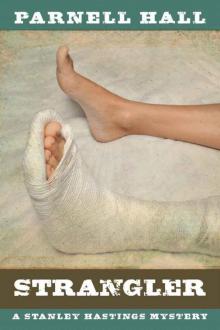 04-Strangler
04-Strangler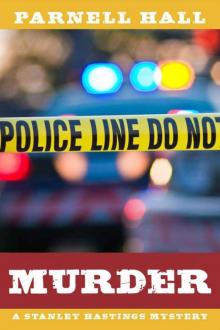 02-Murder
02-Murder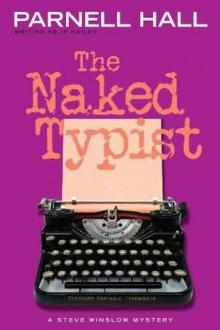 SW04 - The Naked Typist
SW04 - The Naked Typist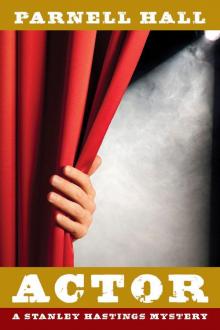 Actor
Actor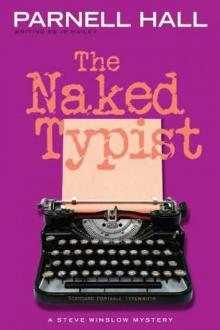 The Naked Typist sw-4
The Naked Typist sw-4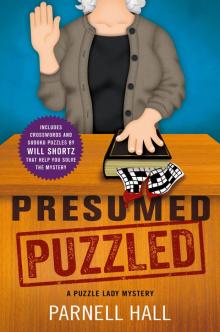 Presumed Puzzled
Presumed Puzzled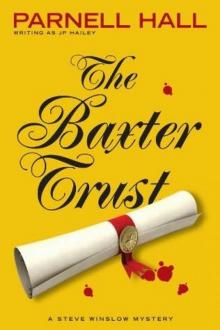 SW01 - The Baxter Trust
SW01 - The Baxter Trust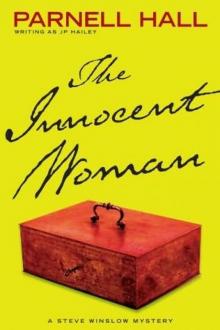 SW06 - The Innocent Woman
SW06 - The Innocent Woman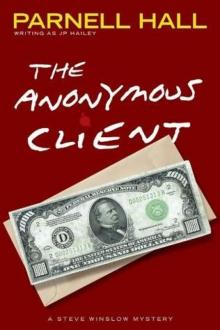 SW02 - The Anonymous Client
SW02 - The Anonymous Client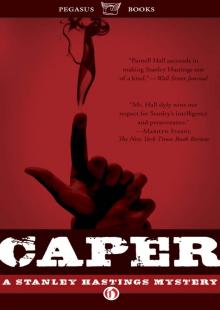 Caper
Caper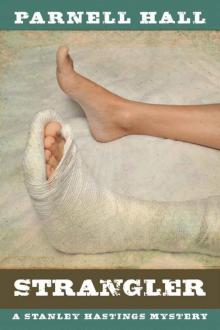 4 Strangler
4 Strangler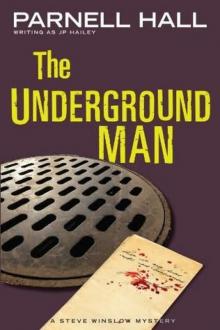 The Underground Man sw-3
The Underground Man sw-3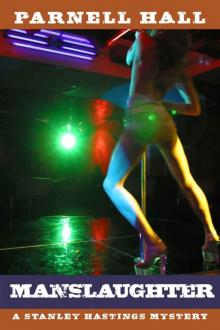 Manslaughter (Stanley Hastings Mystery, #15)
Manslaughter (Stanley Hastings Mystery, #15)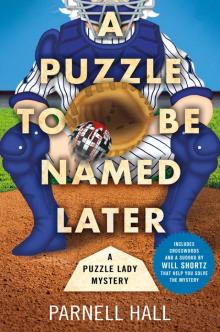 A Puzzle to Be Named Later--A Puzzle Lady Mystery
A Puzzle to Be Named Later--A Puzzle Lady Mystery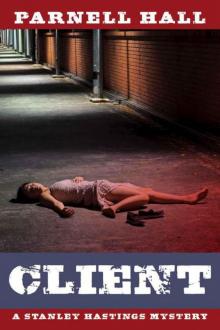 05-Client
05-Client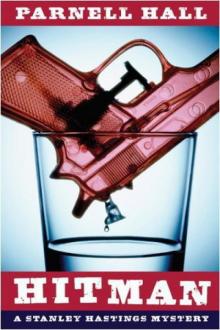 16 Hitman
16 Hitman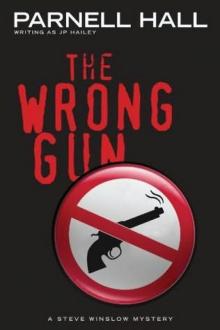 SW05 - The Wrong Gun
SW05 - The Wrong Gun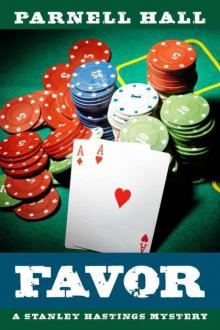 3 Favor
3 Favor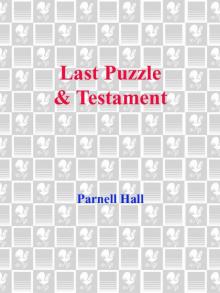 Last Puzzle & Testament
Last Puzzle & Testament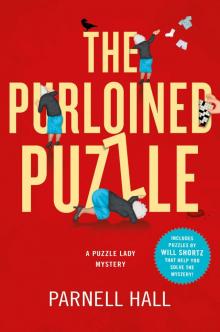 The Purloined Puzzle
The Purloined Puzzle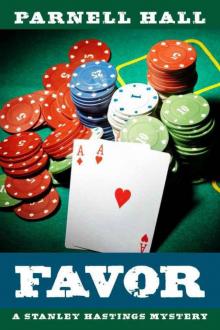 03-Favor
03-Favor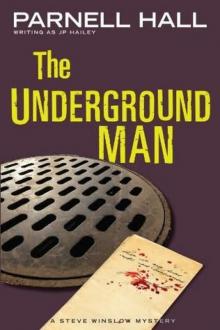 SW03 -The Underground Man
SW03 -The Underground Man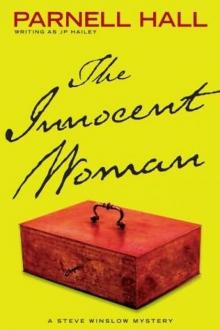 The Innocent Woman sw-6
The Innocent Woman sw-6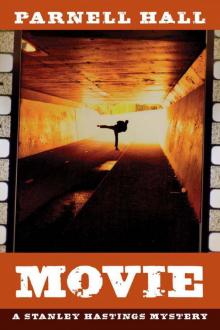 10 Movie
10 Movie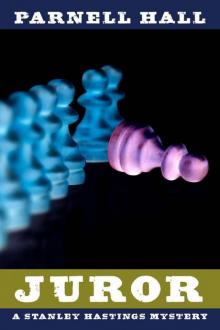 06-Juror
06-Juror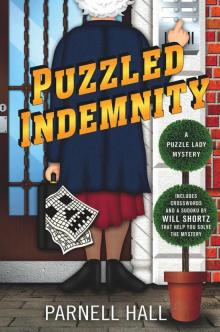 Puzzled Indemnity
Puzzled Indemnity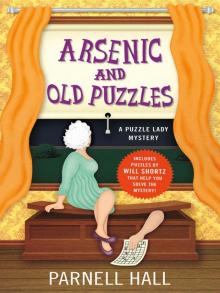 Arsenic and Old Puzzles
Arsenic and Old Puzzles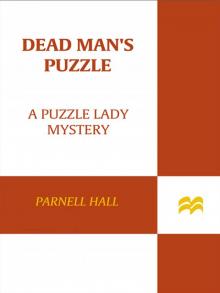 Dead Man's Puzzle
Dead Man's Puzzle Safari
Safari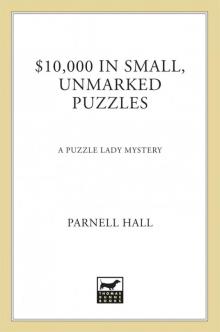 $10,000 in Small, Unmarked Puzzles
$10,000 in Small, Unmarked Puzzles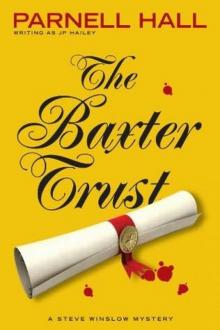 The Baxter Trust sw-1
The Baxter Trust sw-1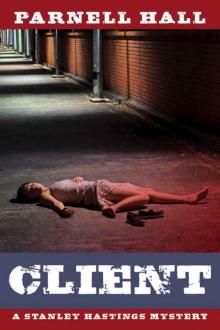 5 Client
5 Client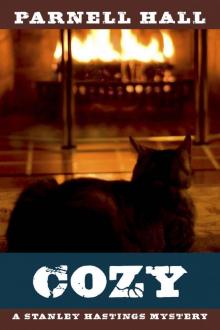 Cozy (Stanley Hastings Mystery, #14)
Cozy (Stanley Hastings Mystery, #14)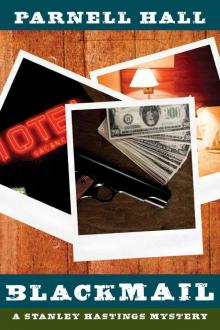 Blackmail
Blackmail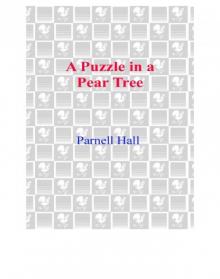 A Puzzle in a Pear Tree
A Puzzle in a Pear Tree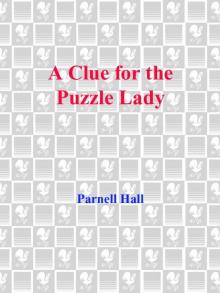 A Clue for the Puzzle Lady
A Clue for the Puzzle Lady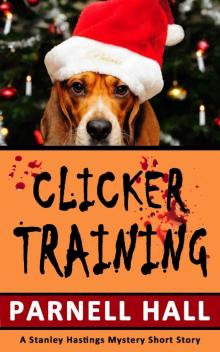 Clicker Training (Stanley Hastings Mystery, A Short Story)
Clicker Training (Stanley Hastings Mystery, A Short Story)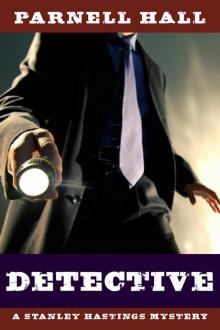 Detective (Stanley Hastings Mystery Book 1)
Detective (Stanley Hastings Mystery Book 1) 13 Suspense
13 Suspense